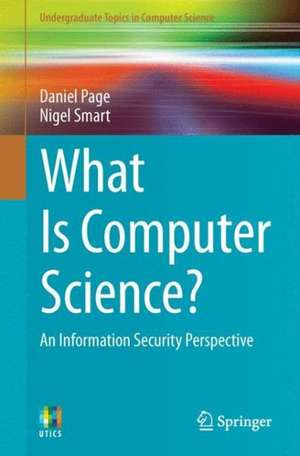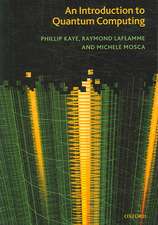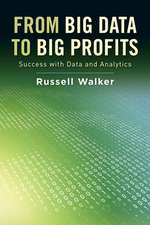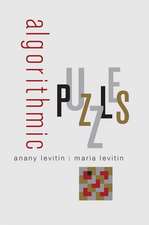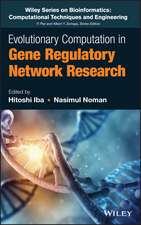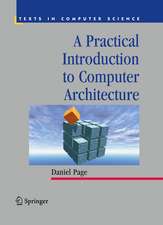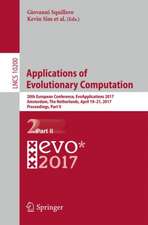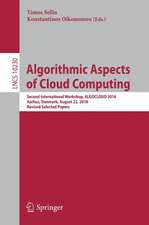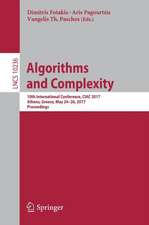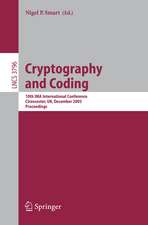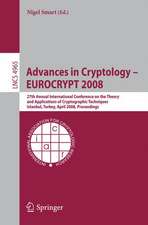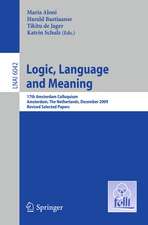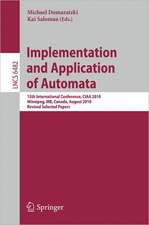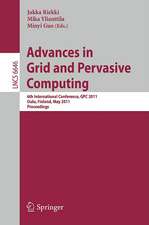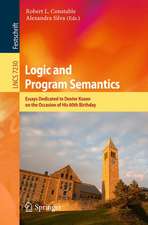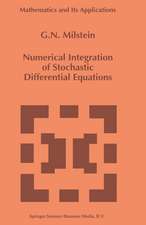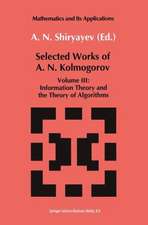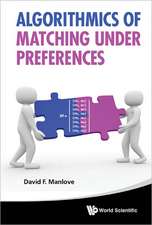What Is Computer Science?: An Information Security Perspective: Undergraduate Topics in Computer Science
Autor Daniel Page, Nigel Smarten Limba Engleză Paperback – 15 ian 2014
Din seria Undergraduate Topics in Computer Science
- 20%
 Preț: 341.22 lei
Preț: 341.22 lei - 20%
 Preț: 233.75 lei
Preț: 233.75 lei - 20%
 Preț: 318.98 lei
Preț: 318.98 lei - 20%
 Preț: 306.58 lei
Preț: 306.58 lei - 20%
 Preț: 187.22 lei
Preț: 187.22 lei - 20%
 Preț: 192.73 lei
Preț: 192.73 lei - 20%
 Preț: 280.93 lei
Preț: 280.93 lei - 20%
 Preț: 287.03 lei
Preț: 287.03 lei - 20%
 Preț: 305.61 lei
Preț: 305.61 lei - 20%
 Preț: 258.79 lei
Preț: 258.79 lei -
 Preț: 334.89 lei
Preț: 334.89 lei - 20%
 Preț: 246.39 lei
Preț: 246.39 lei - 20%
 Preț: 384.11 lei
Preț: 384.11 lei - 20%
 Preț: 272.43 lei
Preț: 272.43 lei - 20%
 Preț: 316.07 lei
Preț: 316.07 lei - 20%
 Preț: 245.43 lei
Preț: 245.43 lei - 20%
 Preț: 376.76 lei
Preț: 376.76 lei - 20%
 Preț: 350.89 lei
Preț: 350.89 lei - 20%
 Preț: 306.72 lei
Preț: 306.72 lei - 20%
 Preț: 374.37 lei
Preț: 374.37 lei - 20%
 Preț: 225.03 lei
Preț: 225.03 lei - 20%
 Preț: 226.65 lei
Preț: 226.65 lei - 20%
 Preț: 375.54 lei
Preț: 375.54 lei - 20%
 Preț: 395.05 lei
Preț: 395.05 lei - 20%
 Preț: 307.17 lei
Preț: 307.17 lei - 20%
 Preț: 254.37 lei
Preț: 254.37 lei - 20%
 Preț: 227.16 lei
Preț: 227.16 lei - 20%
 Preț: 304.37 lei
Preț: 304.37 lei - 20%
 Preț: 336.99 lei
Preț: 336.99 lei - 20%
 Preț: 316.24 lei
Preț: 316.24 lei - 20%
 Preț: 304.13 lei
Preț: 304.13 lei - 20%
 Preț: 342.46 lei
Preț: 342.46 lei - 20%
 Preț: 276.82 lei
Preț: 276.82 lei - 20%
 Preț: 237.35 lei
Preț: 237.35 lei - 20%
 Preț: 374.20 lei
Preț: 374.20 lei - 20%
 Preț: 304.44 lei
Preț: 304.44 lei - 20%
 Preț: 297.28 lei
Preț: 297.28 lei - 20%
 Preț: 579.37 lei
Preț: 579.37 lei - 20%
 Preț: 298.18 lei
Preț: 298.18 lei - 20%
 Preț: 243.35 lei
Preț: 243.35 lei - 20%
 Preț: 302.80 lei
Preț: 302.80 lei - 20%
 Preț: 297.66 lei
Preț: 297.66 lei - 20%
 Preț: 300.89 lei
Preț: 300.89 lei - 20%
 Preț: 191.36 lei
Preț: 191.36 lei - 20%
 Preț: 278.11 lei
Preț: 278.11 lei - 20%
 Preț: 304.21 lei
Preț: 304.21 lei
Preț: 241.73 lei
Preț vechi: 302.17 lei
-20% Nou
Puncte Express: 363
Preț estimativ în valută:
46.26€ • 50.23$ • 38.86£
46.26€ • 50.23$ • 38.86£
Carte tipărită la comandă
Livrare economică 18-24 aprilie
Preluare comenzi: 021 569.72.76
Specificații
ISBN-13: 9783319040417
ISBN-10: 3319040413
Pagini: 252
Ilustrații: XVIII, 232 p. 84 illus.
Dimensiuni: 155 x 235 x 13 mm
Greutate: 0.36 kg
Ediția:2014
Editura: Springer International Publishing
Colecția Springer
Seria Undergraduate Topics in Computer Science
Locul publicării:Cham, Switzerland
ISBN-10: 3319040413
Pagini: 252
Ilustrații: XVIII, 232 p. 84 illus.
Dimensiuni: 155 x 235 x 13 mm
Greutate: 0.36 kg
Ediția:2014
Editura: Springer International Publishing
Colecția Springer
Seria Undergraduate Topics in Computer Science
Locul publicării:Cham, Switzerland
Public țintă
Lower undergraduateCuprins
Part I: Foundations of Computer Science.- Compressing and Correcting Digital Media.- Writing and Comparing Algorithms.- Playing Hide-and-Seek with Virus Scanners.- How Long is a Piece of String?.- Demystifying Web-Search: The Mathematics of PageRank.- Part II: Examples from Information Security.- Using Short Programs to Make and Break Historical Ciphers.- Generation and Testing of Random Numbers.- Safety in Numbers: Modern Cryptography from Ancient Arithmetic.- Hiding a Needle in a Haystack: Concealed Messages.- Picking Digital Pockets.
Recenzii
From the reviews:
“The main audience of this textbook is students (either currently studying subjects related to CS or thinking about enrolling in that area of study) as well as teachers (who might use the book when preparing and developing courses and teaching materials). … The book can facilitate independent learning. … the book walks its readers through relevant and reasonably detailed examples, providing relatable ideas that will help them grasp these concepts.” (Budi Arief, Computing Reviews, May, 2014)
“The main audience of this textbook is students (either currently studying subjects related to CS or thinking about enrolling in that area of study) as well as teachers (who might use the book when preparing and developing courses and teaching materials). … The book can facilitate independent learning. … the book walks its readers through relevant and reasonably detailed examples, providing relatable ideas that will help them grasp these concepts.” (Budi Arief, Computing Reviews, May, 2014)
Notă biografică
Dr. Daniel Page and Prof. Nigel Smart are lecturers in the Department of Computer Science at the University of Bristol, UK, affiliated to the Cryptography and Information Security Group. Daniel Page is also the author of the Springer textbook A Practical Introduction to Computer Architecture.
Textul de pe ultima copertă
The remarkable diversity of ideas within the subject of computer science makes it highly rewarding and exciting to study, yet also difficult to describe in essence.
This engaging and accessible text addresses the fundamental question: What Is Computer Science? Rather than supplying a brief overview of every relevant topic, the book showcases a set of representative concepts broadly connected by the theme of information security. The presentation of each topic can be treated as a "mini" lecture course, demonstrating how it allows us to solve real problems, as well as how it relates to other subjects. The discussions are further supported by numerous examples and practical hands-on exercises, which together will be sure to whet your appetite for the many fascinating aspects of computer science.
Topics and features:
This engaging and accessible text addresses the fundamental question: What Is Computer Science? Rather than supplying a brief overview of every relevant topic, the book showcases a set of representative concepts broadly connected by the theme of information security. The presentation of each topic can be treated as a "mini" lecture course, demonstrating how it allows us to solve real problems, as well as how it relates to other subjects. The discussions are further supported by numerous examples and practical hands-on exercises, which together will be sure to whet your appetite for the many fascinating aspects of computer science.
Topics and features:
- Presents a concise introduction to the study of algorithms, and describes how computers work using the example of computer viruses
- Introduces the concepts of data compression, and error detection and correction
- Highlights the role of data structures, and how their design can have a profound influence on algorithms that operate on them
- Explores the topic of web-search, with a specific focus on examples drawn from cryptography and information security
- Reviews both historic and modern cryptographic schemes, examines how a physical system can leak information, and discusses the idea of randomness
- Investigates the science of steganography, the hiding of secret data within non-secret data
- Provides additional supplementary material at an associated website
Caracteristici
Explains the fundamental topics in computer science using a set of easily identifiable examples and applications Provides a unified approach, offering exercises that can be reproduced by the reader without the need for any prior programming experience Presents each topic in the form of a "mini" lecture course, demonstrating how it allows us to solve real problems Includes supplementary material: sn.pub/extras
